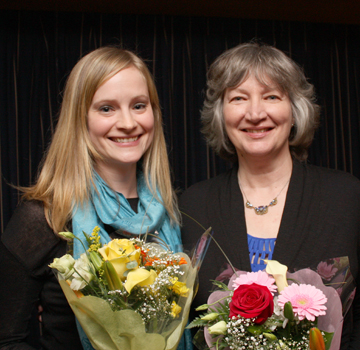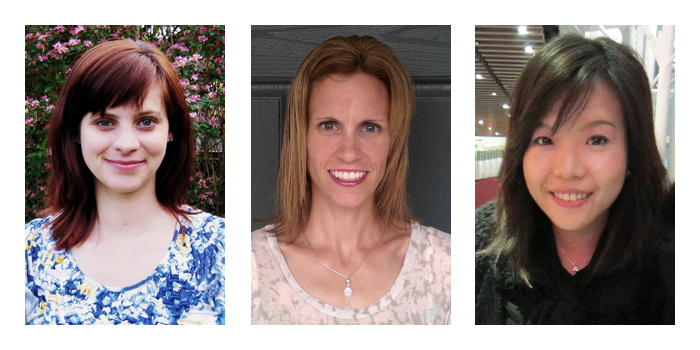
Heather Burrett (left) and Anne Leclerc, Master of Rehabilitation Science Fall 2011 grads
The tradition of holding a reception honouring the most recent graduates from the UBC Rehabilitation Science Graduate programs is well established now and serves as an opportunity for the graduates, the faculty, family, and the ever expanding rehabilitation community to celebrate their accomplishments. On November 24, Sue Stanton, Director of the Master in Rehabilitation Science program and Associate Professor in the Department of Occupational Science and Occupational Therapy (OS&OT) was the MC for the evening and began the formal speeches with the following:
“People with disabilities have it… Marathon runners have it… and graduates also have it — in spades. What is it? Persistence and determination to get a fix on a goal and work as hard as they know to reach that target. Tonight we are here to honour all of the graduates and to recognize the result of these important attributes.”
The Fall 2011 graduates include: Rick Celebrini receiving his Doctor of Philosophy, Sandra Hale, Sarah Neil and Jeanie Zabukovec , their Master of Science, and Marjorie Berry, Heather Burrett, Delicia Jackson, Anne Leclerc and Elaine Widgett, their Master of Rehabilitation Science.
Also present at the reception were honoured guests from the UBC Faculty of Medicine: Dr. Peter Leung, Associate Dean for Graduate and Post Doctorate Education, Dr. Brenda Loveridge, Associate Dean of Health Professions, and Dr. Jayne Garland, Head of Department of Physical Therapy.
Dr. Leung offered a few words on behalf of the Dean of Medicine, who was unable to attend. He began by expressing how deeply honoured he was to be present and proud of the accomplishments of the graduates and the growing reputation of the programs as the best in North America and in the world. Dr. Leung described the grads as the best ambassadors for the programs, given they were leaders in rehabilitation science whether their studies advanced science, theory or found solutions to workplace problems. He suggested that their studies may be some of their most treasured memories of their professional lives, and that the relationships established will continue in the future helping to support and celebrate future accomplishments. Dr. Leung concluded with commendations of the graduates’ hard earned achievements and looked forward to their further contributions to the advancement of the science of rehabilitation and promotion of physical, mental and social well being among people of all levels of ability.
Dr. Lyn Jongbloed, who is also a member of the OS&OT Department and oversees the Phd and MSc programs, introduced Sandra Hale, who spoke on behalf of the MSc graduates. In addition to expressing the shared happiness of completing their degrees, Sandra paid special tribute to the research participants because, in Sandra’s words, “without them, we would not be able to do what we do.”
Rick Celebrini, who was the sole recipient of the Doctor of Philosophy degree, admitted that he had no idea of what he was getting into 7 years ago but can probably be described as not only a marathon runner but a tri-athlete. While completing his PhD, Rick recounted other dear and important mileposts. He became a husband, father of three kids, chief therapist for the 2010 Olympic and Paralympic games, and dealt with the emotional impact of the death of his father. Rick notes that although these don’t act as credits in accomplishing a Phd., he credited and named many people who were part of his support team and who helped him balance family and career goals.
- The final words were given by MRSc graduate Heather Burrett with Anne Leclerc at her side. She shared that all the graduates took on the MRSc seeking an academically challenging program with very practical workplace applications. Although the other graduates were unable to attend, they had sent their thoughts about ‘connecting dots’ to Heather who relayed them to those present. Please listen to her full speech.
MC Sue Stanton concluded the formal speeches of the evening with four principles Rick Hansen offered in this book Going the Distance: Seven steps to personal change.
1. Recognize that goals are both objective and subjective; objective in that you accomplished them and subjective in terms of how you feel about them;
2. Take responsibility for your success – recognize that your actions actually created this end project;
3. Celebrate your success [as we are doing this evening]; and
4. Identify the ingredients of your success so can you apply the recipe to your next goal.
Many thanks to Andrea Walus and Sally Clark for a successful reception that was memorable for the graduates and all the members of their support teams.

